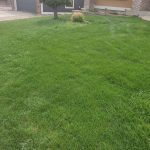Changing seasons mean we need to pay extra attention to our lawns. At Erbert Lawns, we know what your lawn needs every time the season changes. This guide will help you take care of your lawn all year round, so it always looks great.
- 1. Spring Awakening
- 2. Summer Care
- 3. Meticulous Preparation for Autumnal Transitions
- 4. Winter Maintenance
- 5. Understanding Lawn Genetics
- The Technicolor of Fertilizers
- Addressing Pest Management Considerations
- Soil Health – The Unsung Hero
- Watering – Not Just Wetting the Surface
- Lawn Mowing
- A Harmony of Techniques
- Conclusion
- Frequently Asked Questions
1. Spring Awakening
After the long winter, your lawn is probably looking a bit dull.
- Aerate the Soil: This allows for oxygen, nutrients, and water to reach grass roots. Learn more about aeration from USDA’s article on soil health.
- Fertilize: Use a balanced fertilizer to jumpstart growth.
- Watering: Morning is the best time.
2. Summer Care
Hot temperatures and dry conditions can stress your lawn.
- Deep Watering: Less frequent but deeper watering encourages root growth.
- Mowing: Keep your grass slightly taller in summer. This shades roots and reduces evaporation. Check out our mowing guide for tips.
- Pest Control: Keep an eye out for insects. The EPA’s guide on pest control is handy.
3. Meticulous Preparation for Autumnal Transitions
As temperatures cool, prepare your lawn for winter.
- Raking: Clear out fallen leaves regularly. This prevents mold and disease.
- Seed & Fertilize: Fall is an excellent time for this.
- Winterizing: This ensures your grass survives the cold. Learn about winterization on NOAA’s Climate.gov.
4. Winter Maintenance
Even during winter, your lawn requires care.
- Avoid Traffic: Walking on frosty grass can damage it.
- Monitor Snow: Heavy snow can lead to mold. It’s vital to manage snow layers.
5. Understanding Lawn Genetics
Depending on the grass type (like Bermuda, Zoysia, or Fescue), the care changes subtly with each season. A deep understanding of different grass types is paramount in maintaining a lush, green lawn throughout various weather changes. So, keep an eye on the kind of grass you have and tailor your care routine accordingly.
The Technicolor of Fertilizers
It’s not merely about scattering some nutrients and calling it a day. Each season demands a different nutrient ratio, and understanding these needs is crucial. Spring leans towards a nitrogen-rich mix to jump-start the growth after winter, while fall typically demands a potassium-heavy fertilizer to prepare the grass for winter hardships. Want a deep dive into fertilization? Be sure to explore our comprehensive fertilization guide for your seasonal needs.
Addressing Pest Management Considerations
Pests can appear in any season, and they’re not too keen on leaving once they’ve settled in. Managing them requires vigilance and an understanding of humane and environmental-friendly solutions. Utilizing integrated pest management (IPM) as highlighted by US EPA and choosing the right pest control products is pivotal in maintaining a healthy lawn without adversely affecting the local ecology.
Soil Health – The Unsung Hero
What’s beneath is what sustains. Healthy soil translates to a vibrant lawn. Regularly testing the soil, understanding its pH, and amending it with required nutrients ensure that it remains a fertile ground for your grass to thrive. But how to achieve optimal soil health? The USDA provides a treasure trove of information about managing and improving soil health effectively.
Watering – Not Just Wetting the Surface
Water is life, especially for your lawn. Each season, the grass thirsts for different watering patterns, and understanding this nuance ensures that your lawn stays lusciously green. Too little or too much water can either starve or drown the roots, leading to a less-than-ideal situation. The expertise lies in striking that moisture balance, and we provide further insights into striking that balance on our detailed watering guide page.
Lawn Mowing
Mowing isn’t just about keeping your lawn neat; it’s about sustaining its health and vigor. Mowing patterns, height adjustments per season, and even the type of mower blades used play crucial roles in ensuring that the grass remains in prime condition throughout the various seasons.
A Harmony of Techniques
Effective lawn care, especially amidst the seasonal transitions, harmonizes various techniques. From understanding the proper mowing patterns to developing an effective watering schedule, each aspect plays a pivotal role in ensuring your lawn remains vibrant, lush, and healthy all year round. Incorporating aerating, dethatching, reseeding, and employing defensive and offensive strategies against pests and diseases – all while bearing in mind the environment and local ecosystem – morphs into a symphony of techniques that brings forth a lawn that’s not merely a patch of grass, but a testament to balanced and seasoned care.
Conclusion
As we traverse through the cyclical progression of seasons, the requirements of a lawn undergo significant variations. Adequate and timely attention ensures that this verdant expanse retains its vigor and aesthetic appeal throughout the year. At Erbert Lawns, our commitment extends beyond mere maintenance; it’s about crafting sustainable, long-term partnerships with our clientele.
Our expertise in lawn care is at your disposal, poised to rejuvenate and fortify your outdoor space. We earnestly invite you to collaborate with us, harnessing our collective vision and passion, to ensure your lawn stands as a testament to nature’s undying beauty and resilience. Should you seek guidance or wish to embark on this journey with us, please contact us to begin this transformative partnership.
Frequently Asked Questions
How often should I water my lawn in summer?
Aim for 1-1.5 inches per week, considering rainfall. Deep watering is preferable.
Is aerating the lawn necessary?
Yes, it helps nutrients, oxygen, and water reach the roots.
When is the best time to seed the lawn?
Fall is often ideal as the ground is warm and moist.
How can I protect my lawn from pests?
Regular maintenance and monitoring.
How tall should I keep my grass in the summer?
Slightly taller than usual to shade roots.
What type of fertilizer should I use in spring?
A balanced one, rich in nitrogen.
Why is raking leaves in fall crucial?
It prevents mold growth and diseases.
How can I winterize my lawn?
Use a winterizing fertilizer and avoid traffic.











